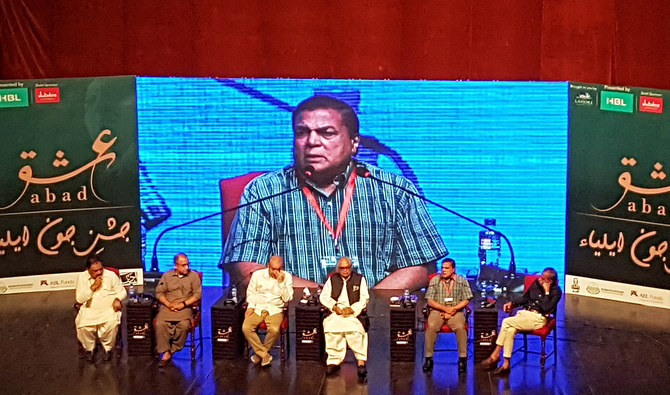LAHORE: A festival celebrating the late Jaun Elia, one of Urdu poetry’s greatest ever names, was held in Lahore this weekend, bringing together poets, writers, and scholars to discuss his life, work, and its lasting impact and marking the launch of a digital platform on Urdu literature.
Jaun Elia was born in Amroha, India, in 1931, as Syed Sibt-e-Asghar Naqvi. He was part of a prominent literary family and was related to famous Bollywood director Kamal Amrohi. Elia relocated to Karachi after the partition of the subcontinent. Known for his wit and unique delivery on stage, Elia passed away in 2002, though he remains an immense influence on modern Urdu poetry to this day.
Ishqabad, an Urdu website that organized the event, also launched an Urdu literature digital platform with the collected works of numerous writers and poets, and to provide younger artists a ready access to a worldwide audience.
Ishqabad is the labor of love of poet Abbas Tabish.
Tabish said there were three reasons he chose Jaun Elia as the central figure of his first literary festival at Alhamra, the city’s art center. “We’ve never had a festival dedicated to him before, he’s one of the greatest Urdu poets, and most importantly, I saw that he was very popular with the younger generation,” he told Arab News.
Tabish is hoping to ignite an Urdu literary revival with his website, and for Jaun Elia’s enduring popularity to be the catalyst. “There are people who’ve never read poetry before but still fall in love with Jaun’s work. There are young poets’ movements dedicated to him in India. Jaunism is real,” he said.
“We have a team of ten people working on the website. We want to include younger poets alongside all the classics, as you can see from the mushaira (gathering where Urdu poetry is recited) there is no shortage [of young poets] in Pakistan,” he added.
“Jashn e Jaun Elia” as the event was titled, hosted a Bait Baazi (poetry game) between university students of Government College and UET. Government College had its own separate session on Saturday, because many of the panelists at the festival are alumni, and the college has a history of producing contemporary poets, including Tabish himself.
Every panelist in the festival shared their own experiences with Elia. Poets Saleem Sagar, Wajih Sani, Kishwar Naheed, and Hammad Ghaznavi remembered him as a maverick who introduced a new way of writing and reciting poetry. “He was a rebel, a thinker, who made you think as well,” Sani said.
“Jaun Elia was my dear friend, he used to visit my house 8 or 9 times a month,” Anwar Maqsood, the renowned satirist and playwright, said. “It is sad to see so many of my literary contemporaries have passed away. But can the new generation produce its own Jaun Elia? That remains to be seen.”
Abbas Naqvi is very hopeful. He is a preeminent literary scholar with a focus on the life and works of Elia.
“Social media has given Jaun Elia a second life. You can see how popular he is with the youth,” Naqvi told Arab News on Sunday.
“Jaun resonates with everyone, during a mushaira, he would make people sit up and listen intently, such was his charm and charisma,” Naqvi said. “Jaun’s poetry was conversational. You might find the classical poets difficult to understand at times, but Jaun wrote in colloquial terms,” he added.
He went on to say that Elia removed the veil of too much respect in Urdu poetry, often using ‘tum’ instead of ‘aap’. The legendary poet also introduced the word ‘jaani’ into popular vernacular, Naqvi added.
“He wrote for future generations, he wrote the way they speak now.”
Ammar Iqbal, born in 1986, always had an inclination for poetry, but the introduction to Elia in his mid-twenties was life-changing. He is now a well-regarded literary figure.
He was part of a panel titled ‘Jaun Elia and the younger generation’. He explained that Elia was an ideal figure of a poet, he didn’t care about appearances or pretensions. “His way of speaking, his mannerisms. He turned something that used to be read, into something that was to be listened to, live.”
Iqbal learned his own style of delivery by watching Elia’s videos. Now he has an Instagram poetry account with 20,000 followers.
Fatima Mehru, another young poet, born in 1990, shared the stage on Sunday with such luminaries as Kishwar Naheed and Harris Khalique. “It has been an honor for me to share the stage with such gems,” she told Arab News.
Mehru’s work is featured on Ishqabad alongside some of the greatest nazam writers Urdu has ever seen. “I was invited to last year’s Lahore Literary Festiva,” she said, expressing happiness to see that “there were poets even younger than me at the mushaira on Saturday.”
















